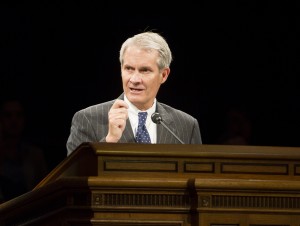
Thomas B. Griffith, of the D.C. Circuit Court of Appeals said, “It’s hard work, to understand the constitution. At least it’s hard work if you try to understand what it meant to those who wrote and ratified its provisions. In my view, that’s the understanding we must seek.”
This committed effort, “rarely attracts any but the most rugged souls,” Griffith said in the forum which was part of BYU’s campus Constitution Day celebration.
The hard work he spoke of involves more than just casual reading, it requires a study of history and culture, grammar and punctuation and it requires above all, “undistracted time.”
Griffith, former assistant to the President and General Counsel of BYU, also emphasized the role of judges in the interpretation, or “translation,” as he called it, of the Constitution.
“You should know that I have firmly held views about right and wrong and I have called upon them to make decisions in my own life…but not in my work as a judge,” he said.
He highlighted the important process of American citizens electing representatives whom they feel represent their moral views and the legislature’s effort to put those ideals into law.
In this way the role of a judge is to, “reinforce the most fundamental principle of the Constitution, that we the people decide the rules of our society through our elected representatives,” Griffith said.
Griffith also warned against, limiting political news sources to “The Daily Show” and participating in petty and partisan arguments. He invited students to actively read The New York Times and The Wall Street Journal, as well as other journals of opinion and analysis.
Considering the heightened political climate this fall of the 2012 election, students received his counsel well.
“I liked that he asked us to be generally politically aware,” said Adelynn Shaffer, a freshman from Arizona studying nursing. “Not everyone has to have the same view, but everyone needs to at least have a view.”
Aaron Petters, a political science major from Stafford,Va., said, “he reminded us that being a Mormon doesn’t have to mean you are a republican. It’s why we have to concentrate and think about what our political beliefs really are.”
“If your education at BYU hasn’t helped you see that such partisan talk is wrought, then you have failed in your studies,” said Griffith. “Disagreement is critical to the well being of our nation, but we must carry out our arguments with the realization that those with whom we disagree are not our enemies.”
Griffith firmly advocated attendance to campus devotional and forum addresses in order to broaden student knowledge and personal growth and spoke of his own experiences as a BYU student and the impact they made.
“The devotionals strengthened my testimony. The forums introduced me to fascinating people from all walks of life with different perspectives that broadened my views. To this day I consider [attending devotionals] one of the best decisions of my life,” Griffith said.
He invited those in attendance to remember the words of President Abraham Lincoln, “We are not enemies, but friends. We must not be enemies. Though passion may have strained, it must not break our bonds of affection… May God bless you and may God bless America.”




